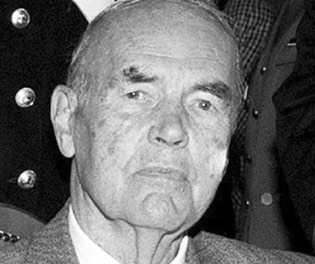Notes From Day Seven: Nazis are people too?
 CREDIT: CONVICTED NAZI WAR CRIMINAL ERICH PRIEBKE DIED ON OCTOVER 11, 2013 AT THE AGE OF 100.
CREDIT: CONVICTED NAZI WAR CRIMINAL ERICH PRIEBKE DIED ON OCTOVER 11, 2013 AT THE AGE OF 100.TELEGRAPH.CO.UK
Should a convicted Nazi war criminal receive a funeral?
You may have heard about the death of 100-year-old Erich Priebke. According to Israelnationalnews.com, he had been living under house arrest ever since a court in 1998 convicted him of overseeing the massacre of 335 people at the Ardeatine caves near Rome in 1944. The massacre was revenge for an Italian attack that killed 33 Germans. Seventy-five of the victims of Ardeatine were Jews, some were young boys, and one was a Catholic priest. Victims were shot in the back of the head, according to International Business News online.
To the end, Priebke denied any guilt. Reporters write that he remained unrepentant, that he claimed he was “only following orders.” He has been labeled a Holocaust denier.
With his death in Rome, there were options regarding the fate of his remains. Some recommended that the body be taken to Germany and incinerated since this is what happened to millions of victims of the Nazi regime. Another option was for the corpse to be returned to Argentina for burial. After all, Priebke lived there for 50 years following World War II. Or the Catholic Church in Rome could have provided a funeral. But both Argentina and the Catholic Church refused the body. The Vatican forbade all churches in Rome from providing a funeral for Priebke.
It is easy to accept that Argentina would refuse any further connection with Priebke and his family. But the Catholic Church? Shouldn't it have been more accommodating?
A closer look, however, shows the situation to be more complicated. While the Vatican did say that no funeral for Priebke could take place in a church, it did say that a Catholic priest could officiate for the family in a private ceremony. And in the end, a priest of a reportedly ultra-conservative Catholic society led the funeral in Albano, a town near Rome. There were angry protestors, and the priest needed the protection of police. But the funeral took place.
Maybe this was all for the best. It would have been unwise for the Catholic Church to allow a funeral in a church in Rome. Old wounds could have been reopened; there could have been large, ugly protests, perhaps less against the church, and more against Priebke himself and the memories he left behind.
But there were also other wounds which perhaps did not need to be revisited, wounds that do not reflect well on the Church. It turns out that Priebke received help after the war from a Catholic Bishop who had pro- Nazi leanings. He, according to Israelnationalnews.com, supplied Priebke with “Vatican travel documents.” Likely Catholic officials feel that they have done all they can to come clean about acts of support for the Nazis. It is reasonable that they would not feel obligated to make themselves the objects of public anti-Catholic protests once again.
So Priebke received a Christian, church burial. A muted one, but a church burial nonetheless.
That the Church gave him a burial is as it should be. Priebke, in spite of all the horrors connected with him and his apparent lack of remorse, was a human being. The Christian understanding of human beings starts with this: We are all created in the “likeness,” in the image of God, Gn. 1:27.
There is much that we do that disfigures, that desecrates that image. Certainly, some of those desecrations are public, invite condemnation, and are not easily forgotten. However, no person should be demonized. For if each, single person is not protected from being demonized, is anyone? Am I? Are you?
Jesus once faced a group of angry men about to stone to death a woman for behaviour punishable by death. He told them that they were free to cast the first stone — provided that none of them had ever sinned. And that's just it. We all have. And yet, we all remain human.
Editorial opinions or comments expressed in this online edition of Interrobang newspaper reflect the views of the writer and are not those of the Interrobang or the Fanshawe Student Union. The Interrobang is published weekly by the Fanshawe Student Union at 1001 Fanshawe College Blvd., P.O. Box 7005, London, Ontario, N5Y 5R6 and distributed through the Fanshawe College community. Letters to the editor are welcome. All letters are subject to editing and should be emailed. All letters must be accompanied by contact information. Letters can also be submitted online by clicking here.













